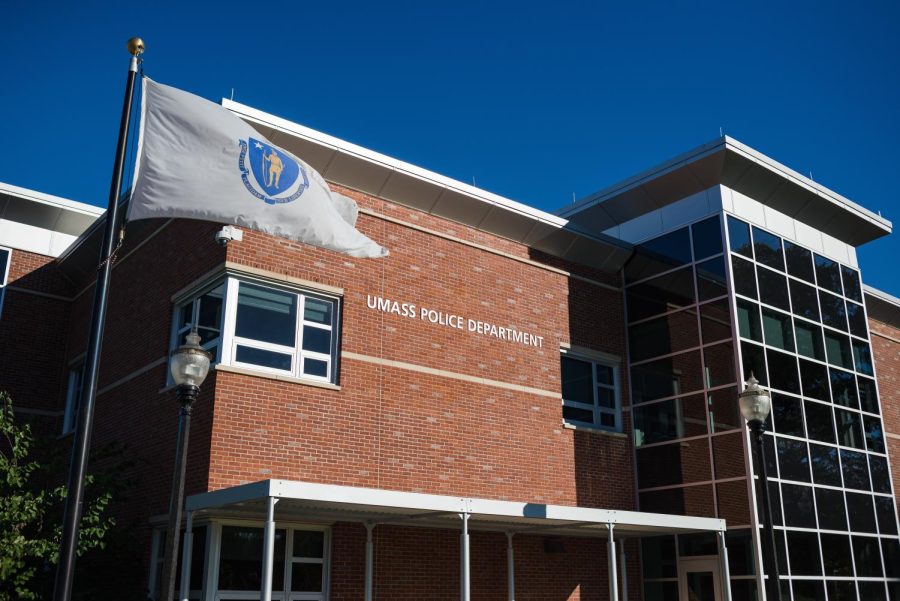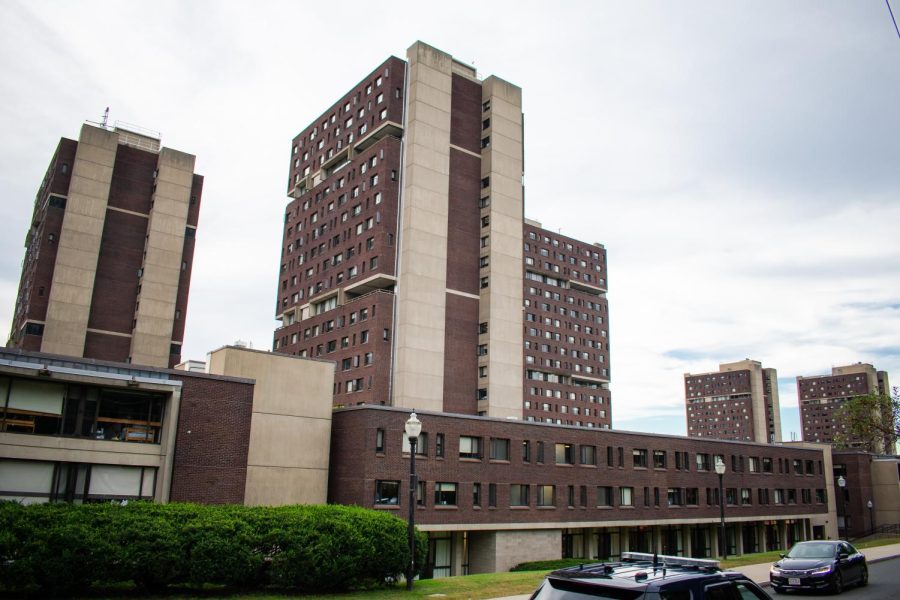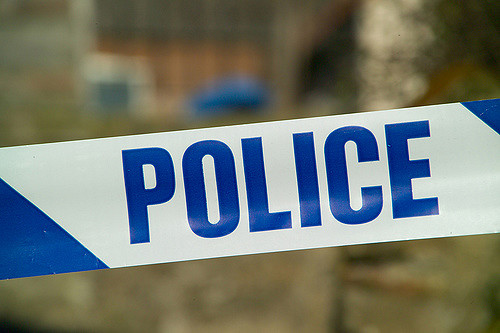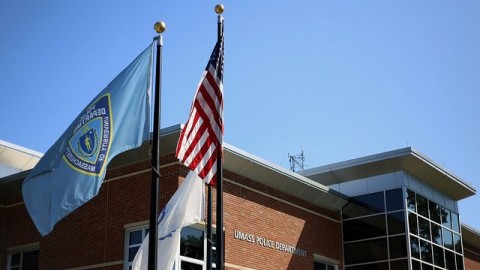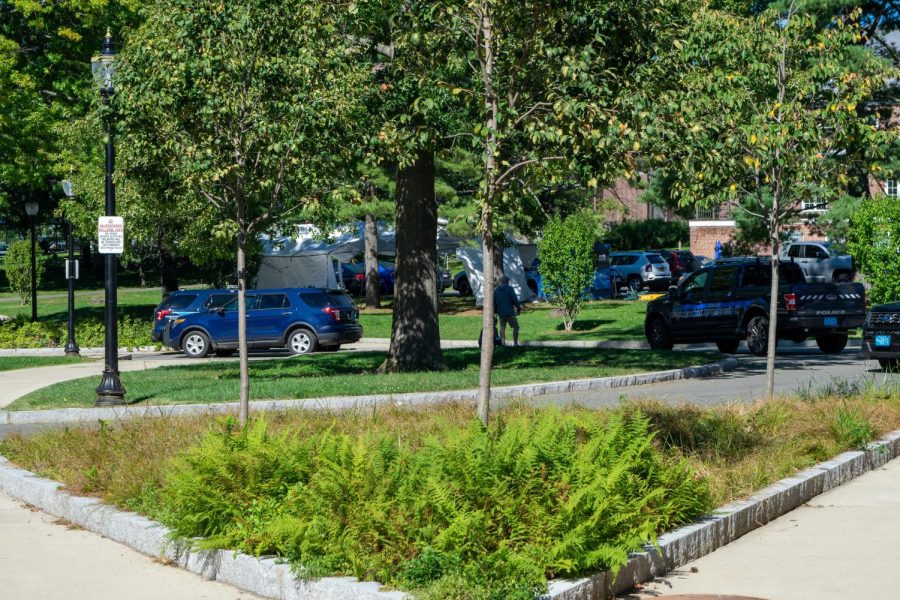
Tyrone Parham, new chief of the University of Massachusetts Police Department, sat down with reporters Friday to discuss his experiences one month into the job.
Parham began his police work in 1993 at Penn State University, serving in roles ranging from detective to chief, according to a UMass press release. The release also stated that he has extensive training in police leadership, criminal investigations, emergency management, excessive celebration and terrorism.”
UMass announced his hire in early December and Parham began his duties on campus Jan. 11. Parham was chosen by a search committee per standard procedure at the University. As reported by the Daily Collegian earlier this month, around 20 university faculty and police members and four student representatives served on the committee.
“Our campus will benefit immensely from Tyrone Parham’s wide-ranging experience at one of the nation’s most prominent public universities,” Chancellor Kumble Subbaswamy said in the press release regarding Parham’s hire. “He is a highly respected leader in campus law enforcement who is committed to building strong relationships in a diverse community. We welcome him to UMass Amherst with great enthusiasm.”
Getting Acquainted
Parham and his family moved to Amherst in January. “It’s been good. A really good transition,” he said of the move and start to the new position. “I’m off to a long and exciting career at UMass.”
In order to get better acquainted with the campus community, Parham often comes to campus in the evening in order to meet with as many student groups as possible. He also came in for a midnight shift “to see how the campus works at night.”
According to Parham, over the past month he has also been meeting with police chiefs from the other UMass campuses. “I come to meetings with lots of ‘in the weeds’ questions,” he added.
His focus these past few weeks? Parham said it’s been figuring out “what things are we doing really, really well and how can we capitalize on that.”
A way to figure out what those things are, is through feedback from the community, he said, calling community outreach “tremendously important.” Parham added that he likes to ask students, “how we can be more engaged?”
For him, there’s a large focus on public perception and trust. “Trust is really big with me, and transparency. Being open, being honest and engaged is in our best interest,” he said.
In terms of becoming familiar with his new department, Parham commented that he was “really impressed with our staff. We’re very well trained, very professional, and very victim-centered in terms of helping.”
Parham said he’s currently reviewing all of UMPD’s policies and procedures, “I want to make sure I’m doing a really thorough job and tweaking what we can do better.”
Campus Safety
According to Parham, the safety challenges faced by UMass are similar to the ones he addressed while working at Penn State University.
He said that town of Amherst and UMass campus present a very safe community and thus one of the biggest challenges UMass faces is “reminding people to remain vigilant.”
“We need students to buy in to the idea of safety,” he said, citing crimes of opportunity such as bag or laptop theft as one of the effects of this sense of security on campus.
Parham also mentioned the number of students he sees walking alone at night as a problem.
“We recommend that you don’t do that,” he said. “Now a lot of times when we say that people assume we’re talking about women but that’s not necessarily true.” Parham explained that police are often answering calls from men who were caught alone in a physical fight after having a verbal altercation.
“We can’t be everywhere at all times so we need a culture where people take ownership of safety,” he said, following up with, “if you see something, say something – that’s not just a tagline.”
One of the ways students are expected to “say something” is via the Blue Light emergency response system on campus which houses phones that call directly to UMPD. This system has come under scrutiny after it was revealed during the recent Durocher trial that the response system didn’t work when students attempted to call police after finding the victim of a sexual assault.
While Parham said he was not aware of the failure, he said that as of Feb. 8, the phones had all been checked and were in working order.
During the media session, Parham was also asked to comment on UMPD’s plans to change its sexual assault crime alert policies after students criticized language used in an alert sent to the community Dec. 11.
Again, Parham said he was unfamiliar with the specifics but that “the language that immediate follows a sexual assault alert, some can perceive as victim blaming.”
He added that, “we want to take a look at the wording. A lot of times it’s aimed at the victim but we need to put ownership of the crime on the perpetrator.”
Parham also discussed the national opiate crisis saying, “We haven’t heard that it’s been a big problem on our campus but I’m not naïve to that fact that it could be.”
He said that it would be a particularly challenging issue to address because it is “hard to detect (so) there is no odor” and because “college students can be functioning addicts.”
Lastly, Parham touched on his crisis training with the FBI saying the advantage of the FBI training is that it gave him a world view perspective. “Sometimes working on a college campus can put you in a silo,” he said. “We are not immune to domestic and international terrorism.”
Marie MacCune can be reached at [email protected] and followed on twitter @MarieMacCune.













